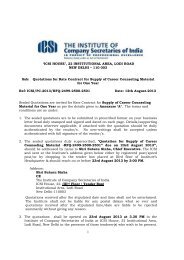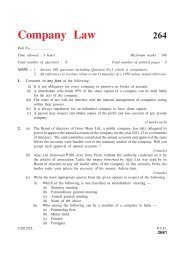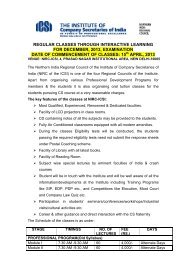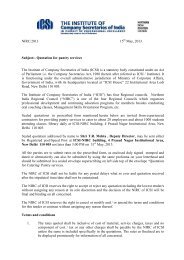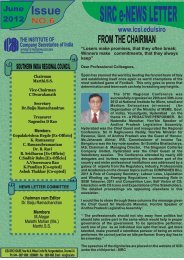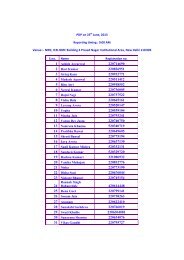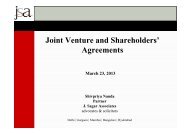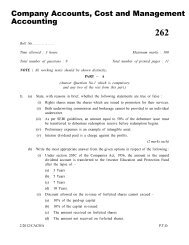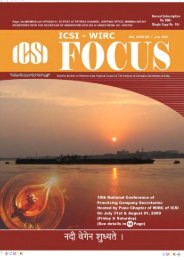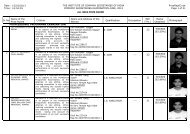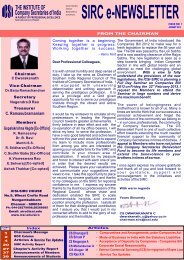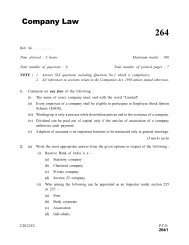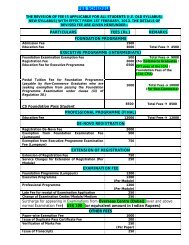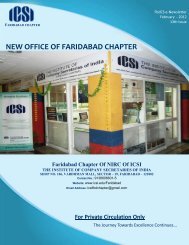March 2012 - Icsi
March 2012 - Icsi
March 2012 - Icsi
You also want an ePaper? Increase the reach of your titles
YUMPU automatically turns print PDFs into web optimized ePapers that Google loves.
Legal Updatesmandatory procedural Compliances would not ipso facto vitiatethe winding up order.Brief facts of the Case:Alleging that the Company Sri Visalakshi Mills Private Limited isnot in a position to pay off its debts, the Petition for obtainingwinding up order was filed. On 24.6.2008, an order was passedappointing Official Liquidator as the provisional liquidator andalso to take charge of the assets of the Company and advertisementwas directed to be listed in the English Daily and Tamil daily andalso in Tamil Nadu Government Gazette fixing the date of hearingas 22.07.2008 with 14 days clear advance notice. Publication innews papers as well as Gazette notification was effected, whichwas produced before the Court by Petitioning Creditor. On3.12.2008, the Court passed an order winding up the Companyand appointing the provisional liquidator, as Official Liquidatorof the Company in liquidation.The appellant, who is none other than the son of Managing Directorof the Company in liquidation, has filed this petition seeking leaveto file the application and also to set aside the order of windingup dated 3.12.2008 on the ground that he is a substantialshareholder in the Company in liquidation and that he is holdingaround 10 percent of total paid up capital of the Company inliquidation and is competent to maintain the petition. The appellantalleged that since he was working in Bangalore he was not awareof the proceedings in relation to the winding up of the Companyand that only recently after 3 years, he came to know that a windingup order had been passed in December 2008. The appellant furtheralleged that upon inspecting the records he found there wasmaterial irregularities in non-compliance of the provisions of lawand that the publication in the newspaper was without cause titleof the Company Petition and that the advertisement was not inthe prescribed form.The appellant alleges two procedural irregularities in effecting theadvertisement:-(i) omission to mention the Company Petition Number andcause title; and(ii) short of two days in effecting Gazette publication. Rules24 and 96 are mandatory.However, according to Respondent, the person entrusted with thejob of giving advertisement submitted that the non-mentioning ofthe cause title and the company petition number was only aninadvertent mistake done by the agent on account of ignorance ofthe legal provisions.Now the question before the Court was: can the non-complianceof procedural mandatory requirement would ipso facto vitiatethe winding up order and stall further proceedings? The nextquestion falling for consideration is: Can the non-compliance of aprocedural mandatory requirement be a ground to set aside thewinding up order after three years, especially when the appellanthad the opportunity of fighting out the litigation in the earlierround?The Madras High Court held thatThe purpose of advertisement is to give an opportunity to thecreditors/debtors/Company to put forth their case before theCourt. Assuming that the procedural mandatory requirement wasnot complied with, in our considered view, it cannot be a groundto set aside the winding up order after three years. As rightlycontended by the learned Senior Counsel for the OfficialLiquidator, to sustain the allegations of violation of principles ofnatural justice, one must establish prejudice. When fairness isshown and if the facts and circumstances indicate that theCompany/contributory were put on notice and that no prejudicewas caused to them, the Company contributory cannot complainof any procedural irregularity. The facts and circumstances clearlyshow that the appellant was not put to any prejudice by theprocedural irregularity in the advertisement non-mentioning ofthe Company Petition number and cause title in the paperpublication.Further, it was very clear that the appellant very well knew aboutthe pendency of the proceedings all along since his own father wasdefending the proceedings and that the appellant cannot takeadvantage of the trivial irregularity in the advertisement. Moreover,in any event, the appellant has no proposal to revive the Companynor anything is produced as to how the appellant proposed tomeet the mounting liabilities of the Company in liquidation andon those findings dismissed the application.Hence, the Court dismissed the appeal by the son of ManagingDirector and declared the proceedings of winding up being inorder.CASE-3:[In the Supreme Court of India, Special Leave Petition]BHARAT RASIKLAL ASHRAVS.GAUTAM RASIKLAL ASHRA[August 25, 2011]Crux of the Judgment:Existence of a valid and enforceable arbitration agreement is acondition precedent before an arbitrator can be appointed undersection 11. When serious allegations of fraud and fabrication aremade, it is not possible for the court to proceed to appoint anarbitrator without deciding the said issue which relates to the veryvalidity of the arbitration agreement.Brief facts of the Case:The appellant and respondent are brothers. A deed of partnershipdated 12.6.1988 was entered among Mr. Kanji Pitamber Ashraand his two grandsons (appellant and first respondent), theirshares being 40%, 30% and 30% respectively. Clause 10 providedthat death of any partner shall not dissolve the partnership firm asto the surviving partners. Clause 11 of the said agreement providedthat all disputes between the partners shall be referred to arbitration.The appellant is permanent resident of United States of America.On the death of Mr. Kanji Pitamber Ashra died on 4.9.1991.According to Respondent, the appellant and first respondentcontinued with the partnership by amending partnership on6.9.1991 by changing their profit and loss ratio from 30% to 50%each. Again according to Respondent, another deed was executedon 19.5.2000 by the appellant and first respondent. Under deeddated 6.9.1991, the share of the appellant was reduced from 50%to 25% and under the deed dated 19.5.2000, the share of theappellant was reduced from 25% to 10% with a further conditionthat if the appellant did not attend to the business on account ofhis commitments elsewhere, the entire profit and loss of the businessshall belong to or borne by the first respondent. The first respondentby letter dated 19.8.2010 stated that the shares of appellant andfirst respondent in the firm were 10% and 90% respectively; that<strong>March</strong>, <strong>2012</strong> 16 NIRC-ICSI Newsletter



